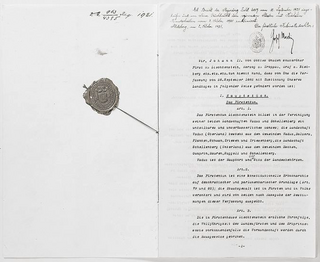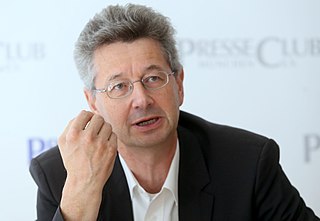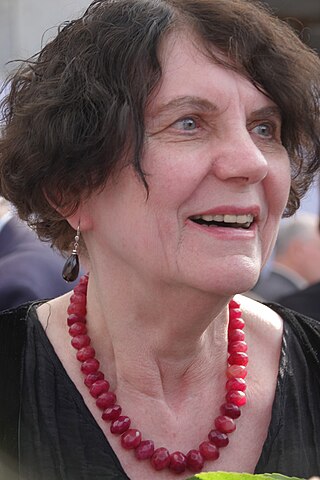Related Research Articles

Wolf children or Little Germans were German and Prussian Lithuanian street children that existed in East Prussia at the end of World War II. Wolf children were mostly orphans left behind in the Evacuation of East Prussia and Red Army invasion in early 1945, with many living homeless in the forests of East Prussia or adopted by Lithuanian families.

Regine Hildebrandt was a German biologist and politician.

The Constitution of the Principality of Liechtenstein was promulgated on 5 October 1921, replacing the 1862 constitution.
The Constitution of Hesse, signed on the December 1, 1946, is the constitution of the German state of Hesse.

The Frankfurt Constitution or Constitution of St. Paul's Church, officially named the Constitution of the German Empire of 28 March 1849, was an unsuccessful attempt to create a unified German nation from the states of the German Confederation.

Oliver Mark is a German photographer and artist known primarily for his portraits of international celebrities.
Carola Stabe is a former dissident and civil rights activist in East Germany GDR. She is the founder and leader of the environmental group ARGUS in Potsdam, Germany. She initiated the GDR- wide opposition network of environmental groups, which later converged in the Grüne Liga.
Referendums in Germany are an element of direct democracy. On the federal level only two types of a mandatory binding referendum exist – adopting a new constitution and regional referendums in case of restructuring the states. On the state level, all states have various types of statewide and municipal referendums.

Erika Stürmer-Alex is a German artist whose works include wall paintings, panel paintings, printed graphics, collage sculptures, polyester sculptures and installations.

Angelika Barbe is a German biologist who became a politician.

Michael Piazolo is a German Free Voter politician, lawyer and political scientist. In 2018 he was appointed as the Bavarian State Minister for Culture and Education in Minister President Söder's second Cabinet.
State elections were held in East Germany on 15 October 1950. They were the last state elections in the country, as the states were dissolved in 1952.
Hans-Christof Kraus is a German historian.

Regina Scheer is a German writer and historian.
Heinz Vietze is a former German politician and party functionary of the Socialist Unity Party (SED) and its successors, the Party of Democratic Socialism (PDS) and The Left.

The Constitution of the State of Schleswig-Holstein of December 13, 1949 came into force on January 12, 1950, under the title State Statute for Schleswig-Holstein. A constitutional and parliamentary reform also led to a change in title on June 13, 1990. The current publication of the constitution of the state of Schleswig-Holstein dates from December 2, 2014.
The Constitution of Rhineland-Palatinate is the constitution for the state of Rhineland-Palatinate adopted by referendum on 18 May 1947.
The Constitution of the Free State of Thuringia is the state constitution of Thuringia; it is valid in this federal state together with the Basic Law of the Federal Republic of Germany.

The Constitutional Court of Brandenburg is the third constitutional body of the State of Brandenburg, alongside the Brandenburg State Parliament and the Brandenburg State Government. As a constitutional court, it is responsible for constitutional disputes.
References
- ↑ "Land ohne Geheimdienst". Der Spiegel (in German). 1991-08-18. ISSN 2195-1349 . Retrieved 2024-09-08.
- ↑ Bildung, Bundeszentrale für politische (2014-10-16). "Das 'Kuratorium für einen demokratisch verfassten Bund deutscher Länder' in der Verfassungsdiskussion der Wiedervereinigung". bpb.de (in German). Retrieved 2024-09-08.